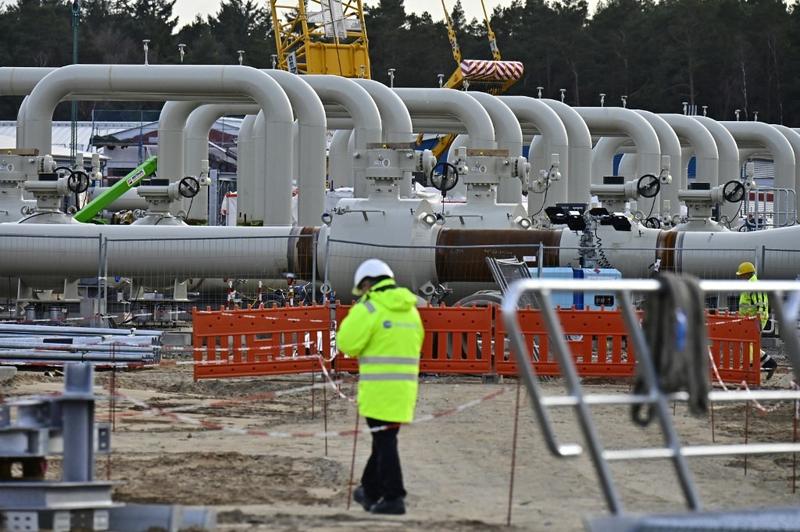 Men work at the construction site of the so-called Nord Stream 2 gas pipeline in Lubmin, northeastern Germany, on March 26, 2019. The Nord Stream 2 pipeline will double the capacity to ship gas from Russia to Germany via the waters of Finland, Sweden and Denmark.
(TOBIAS SCHWARZ / AFP)
Men work at the construction site of the so-called Nord Stream 2 gas pipeline in Lubmin, northeastern Germany, on March 26, 2019. The Nord Stream 2 pipeline will double the capacity to ship gas from Russia to Germany via the waters of Finland, Sweden and Denmark.
(TOBIAS SCHWARZ / AFP)
MOSCOW / VLADIVOSTOK / OTTAWA – Russia's Gazprom Export will suspend gas deliveries to Finland from Saturday, as it had not received the necessary payment in rubles from Finnish state-owned energy firm Gasum.
"By the end of the working day on May 20 (the payment deadline stipulated by the contract), Gazprom Export did not receive any payments from Gasum for the gas supplied in April," local media reported citing Gazprom Export.
READ MORE: Russia reacts to possible NATO weapon deployment in Finland
"Gazprom Export has notified Gasum of the suspension of gas supplies starting from May 21, 2022, until payment is made in accordance with the procedure established by the decree," it said.
Russian Defense Minister Sergei Shoigu said Russia would create 12 new military units in its Western Military District in response to increased military activity of the North Atlantic Treaty Organization, and the potential accession of Finland and Sweden
Gazprom Export sent a letter to Gasum in April, requiring the company to pay for gas in rubles instead of euros. "Gasum did not accept the offer of the Russian company and applied to arbitration regarding the contract," according to the Finnish energy firm.
Russia to strengthen Western flank
Russian Defense Minister Sergei Shoigu said Friday that Russia would create 12 new military units in its Western Military District in response to increased military activity of the North Atlantic Treaty Organization, and the potential accession of Finland and Sweden.
"The United States and NATO are stepping up operational and combat training near our borders," Shoigu said during a meeting of the Defense Ministry Board.
"In addition, our closest neighbors Finland and Sweden have applied to join NATO," he added.
Shoigu said Russia would "adopt adequate countermeasures" under the current circumstances by "improving the combat composition of troops" and forming 12 military units in the Western Military District by the end of the year.
The armed forces would also be supplied with modern weapons and military equipment, he added.
New nuclear-powered subs
Russia's Pacific Fleet will receive two nuclear submarines and one diesel-electric submarine in 2022, Fleet Commander Admiral Sergei Avakyants said Friday.
The first nuclear strategic submarine of the Borei-A class, Knyaz Oleg, and the first nuclear submarine of the Yasen-M class, Novosibirsk, will join the Pacific Fleet this year, Avakyants was quoted by TASS as saying.
Knyaz Oleg will be equipped with Bulava ballistic missiles, which have a range of more than 8,000 km. Novosibirsk is a multi-purpose nuclear submarine, armed with Kalibr and Onyx cruise missiles.
ALSO READ: Finland, Sweden apply to join NATO
Speaking on the occasion of the 291st anniversary of the Pacific Fleet, Avakyants said that the fleet is also expecting the arrival of a silent diesel-electric submarine, Magadan, which is also equipped with Kalibr missiles.
The Russian Pacific Fleet is a part of the Russian Navy, based in the city of Vladivostok. It belongs to the Russian Eastern Military District.
Canada bans targeted luxury goods trade with Russia
Canadian Minister of Foreign Affairs Melanie Joly announced on Friday a ban on the export of targeted luxury goods to Russia as well as a ban on the import of targeted luxury goods from Russia.
Canada is also banning the importation of targeted luxury goods from Russia, including alcoholic beverages, seafood, fish and non-industrial diamonds
According to a news release, Canada is banning the export of targeted luxury goods to Russia, including alcoholic beverages, tobacco, some textile products and sportswear, footwear, luxury clothing and accessories, jewelry, kitchenware, and art.
Canada is also banning the importation of targeted luxury goods from Russia, including alcoholic beverages, seafood, fish and non-industrial diamonds.
Together, these categories represented 75.7 million Canadian dollars ($60.6 million) worth of goods in 2021.
Meanwhile, Canada is imposing new sanctions on 14 individuals including Russian oligarchs, their family members, and close associates of Russian President Vladimir Putin. These bans will help mitigate the potential for Russian oligarchs to circumvent restrictions in other luxury goods markets, the news release said, adding that Canada is also implementing a ban on the export of goods that could be used in the production and manufacture of weapons by Russia.
Since Feb 24 this year, Canada has imposed sanctions on more than 1,000 individuals and entities from Russia, Ukraine and Belarus.


